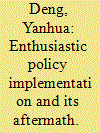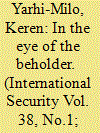| Srl | Item |
| 1 |
ID:
159845


|
|
|
|
|
| Summary/Abstract |
Many China scholars have explored shirking by local officials and “effective implementation,” but fewer have examined polices that are implemented with great enthusiasm. The Microfinance for Women Programme fits in this last category. Especially in Sichuan, targets for lending were set by the province, exceeded, raised by cities and counties, and then exceeded again. The immediate reason that lending took off in 2012 was the relaxation of collateral requirements that shifted the risk of defaults away from local authorities. But the surge in lending also had deeper roots in the policy's vagueness, institutional incentives, bureaucratic pressure, and local fiscal and organizational interests. Although enthusiastic implementation occurred (and generated much-needed revenues for local governments), the history of the programme also shows that it can be halted, as was the case when instability loomed and the authorities reversed bureaucratic pressure by calling for local cost-sharing and introducing uncertainty over whether interest subsidies would continue.
|
|
|
|
|
|
|
|
|
|
|
|
|
|
|
|
| 2 |
ID:
122084


|
|
|
|
|
| Publication |
2013.
|
| Summary/Abstract |
How do policymakers infer the long-term political intentions of their states' adversaries? A new approach to answering this question, the "selective attention thesis," posits that individual perceptual biases and organizational interests and practices influence which types of indicators a state's political leaders and its intelligence community regard as credible signals of an adversary's intentions. Policymakers often base their interpretations on their own theories, expectations, and needs, sometimes ignoring costly signals and paying more attention to information that, though less costly, is more vivid (i.e., personalized and emotionally involving). In contrast, intelligence organizations typically prioritize the collection and analysis of data on the adversary's military inventory. Over time, these organizations develop substantial knowledge on these material indicators that they then use to make predictions about an adversary's intentions. An examination of three cases based on 30,000 archival documents and intelligence reports shows strong support for the selective attention thesis and mixed support for two other approaches in international relations theory aimed at understanding how observers are likely to infer adversaries' political intentions: the behavior thesis and the capabilities thesis. The three cases are assessments by President Jimmy Carter and officials in his administration of Soviet intentions during the collapse of détente; assessments by President Ronald Reagan and administration officials of Soviet intentions during the end of the Cold War; and British assessments of Nazi Germany before World War II.
|
|
|
|
|
|
|
|
|
|
|
|
|
|
|
|